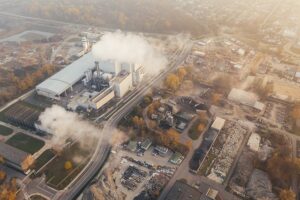
Earth will be changed dramatically. Many people are already suffering because of natural disasters, but in the future, it will get worse.
The 5th Assessment Report of the Intergovernmental Panel on Climate Change (IPCC) was launched recently in Japan after three years of work by over 800 scientists from 70 countries.
The IPCC is a United Nations body that periodically assesses the state of climate science and provides policy-makers with clear scientific information on the risks of climate change.
The report makes it very clear that climate change is already happening, and that if we don’t take action now, the consequences will be devastating.
The report warns that the world is on track for an increase in the global average temperature of between 3.7-4.8 degrees Celsius by 2100.
Global average temperatures are already up 0.85C compared with the pre-industrial period, and over the coming century extreme weather events, heatwaves, droughts, sea level rise and destruction of natural ecosystems will intensify unless we cut greenhouse gas emissions.
For example, the report predicts that sea levels could rise by 26 to 82 centimeters this century.
This could have devastating consequences for cities in low-lying areas, such as Ho Chi Minh City, Mumbai and Kolkata.
Food production will be hit hard too – up to 30% less food will be available in some parts of the world, which will lead to increased malnutrition and starvation.
Similarly, an increase in extreme weather events – such as floods, droughts and hurricanes – is expected to take a heavy toll on human life and will have a devastating impact on local ecosystems.
In just one example from the report, it’s estimated that there could be a 50% reduction in the rice crop in Asia.
Why is it important to combat the climate crisis?
It is important to combat the climate crisis because it threatens our very survival. The consequences of inaction are extremely serious and will affect everyone on the planet.
We need to take urgent action to reduce greenhouse gas emissions and to adapt to the changes that are already happening. We need to do this in order to protect our environment, protect our health, protect our jobs and protect future generations.
The report makes it clear that the consequences of climate change are happening now and will only get worse unless we act fast to cut greenhouse gas emissions.
What will happen if climate change keeps going?
If we do not cut emissions fast enough and emissions continue to rise, the risks that we will face are enormous. These include:
- Huge changes in ecosystems – such as melting ice caps and coral reefs, floods, droughts and famines, extreme storms, and huge biodiversity losses.
- Mass migration – Climate change is expected to displace millions of people in the future, as well as contribute to social and political instability.
- Increased health risks – Air pollution, exposure to extreme weather events, and changes in food production will all have serious health impacts.
- Economic damage – The cost of dealing with climate change is already estimated at $1.5 trillion a year, and this is set to increase.
- Catastrophic climate change – If we don’t take urgent action to reduce emissions, it is possible that the Earth could reach a point where it is no longer habitable for humans.
Global warming predictions 2050
The Intergovernmental Panel on Climate Change predicts that the Earth’s temperature will reach a point in 2050 where it is 1.5 degrees Celsius warmer than it was before the Industrial Revolution.
In order to avoid this, we need to take urgent action to reduce greenhouse gas emissions.
We can make a difference!
The good news is that we know we can avoid the worst effects of climate change if we make the right changes now.
If we take ambitious, early and coordinated action to improve energy efficiency and switch from fossil fuels to renewables like solar and wind, we can reduce greenhouse gas emissions and prevent dangerous warming.
But cutting greenhouse gases will also create new jobs, reduce air pollution, which causes millions of deaths each year; and improve energy security by reducing our dependence on foreign oil.
- Related post: What would happen if the earth stops spinning
- Related post: What Would Happen if Oxygen Were to Disappear
How can we solve the climate crisis?

There is no one-size-fits-all answer to the climate crisis, but we do know that we need to take urgent action to reduce greenhouse gas emissions. We can do this by:
Switching from fossil fuels to renewables like solar and wind
The fastest way to reduce greenhouse gas emissions is to use energy more efficiently and switch from power sources that emit large amounts of carbon dioxide (carbon-based fuels such as coal, oil and gas) to carbon-free or low-carbon alternatives (renewables like solar and wind).
Improving energy efficiency
We can also reduce emissions by using energy more efficiently.
There are many ways to do this, such as making our homes and businesses more energy-efficient, using smarter technologies and driving less.
Taking action on deforestation
Tropical deforestation is responsible for about 10% of global greenhouse gas emissions, so it is critical that we take action to stop it.
This includes protecting forests, restoring degraded forests and reducing the demand for products that contribute to deforestation.
Making changes in our daily lives
We can also make a difference by making small changes in our daily lives, such as eating less meat, taking public transport, using plastic bags or water bottles, driving less and turning off unnecessary lights.
Supporting policy changes
Political action is also needed to reduce emissions. We need to switch to low-carbon energy sources, phase out dirty fuels and invest in renewables.
Governments must also support measures to protect forests and help people adapt to the effects of climate change.
Conclusion
The science is clear: climate change is real, it’s happening now, and it’s a serious threat to our planet and our way of life. We need to take urgent action to reduce greenhouse gas emissions if we want to avoid the worst effects of climate change.
There are many things we can do to make a difference, from making small changes in our daily lives to supporting policy changes.
We can all play our part in tackling the climate crisis and creating a more sustainable future for our planet.
There is no one-size-fits-all answer to the climate crisis, but we do know that we need to take urgent action to reduce greenhouse gas emissions.


